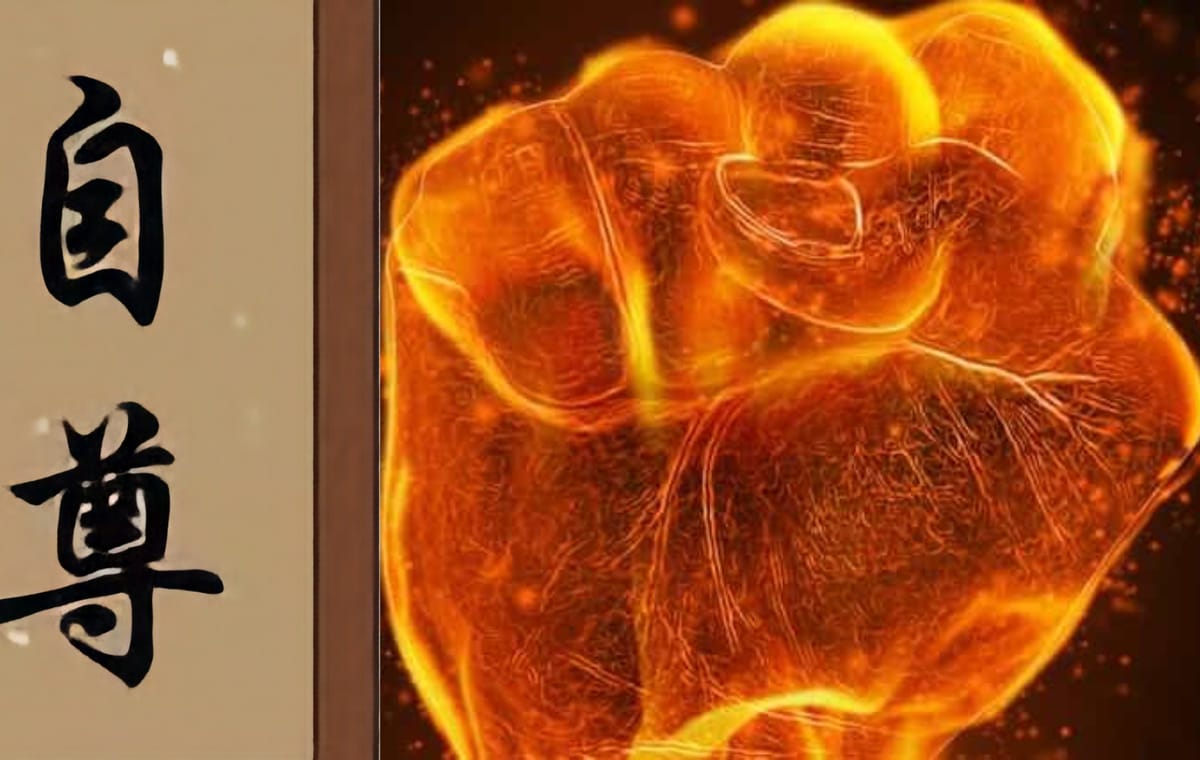Jison (sometimes written as Jisonshin) is self-respect. Self-respect is a key characteristic of the successful karateka and must be trained, nurtured, and protected.
Jison 自尊 [pronounced “gee-sohn”] is “self-respect" – a key characteristic of the karateka and an important value to be nurtured and protected.
Sometimes this is expressed as Jisonshin 自尊心 to further emphasize that this is a state-of-mind. These two notations express the same concept, however.
Self-respect is confidence in one's own worth, abilities, and philosophy. Sometime referred to as "self-esteem" it encompasses beliefs about oneself as well as emotional states, such as triumph, despair, pride, and shame.
The karateka nurtures and protects his or her self-respect: it is a value worth defending.
Self-Respect as Confidence
We are constantly beset by challenges and obstacles as we go about working to accomplish our goals. That certainly is to be expected: accomplishing anything of significance will always include overcoming obstacles. Knowing that we have strong skills and that we have a good idea of our goals creates a certain confidence: in some ways this is self-respect.
However, we also are beset by naysayers and negative influences. They can be actual people who, in person, tell us we can't accomplish what we want because the obstacles are too great (and by extension, sometimes left unsaid, we aren't good enough to overcome those challenges).
Or those negative influences may come from inanimate influences, such as social media or the general culture around us. Oftentimes, we are told (overtly and subtly) to prize ephemeral "experiences" over true accomplishment and productivity; or we are told that "we used to accomplish great things, but we don't anymore." These are all examples the corrosiveness of social media and the debilitating effects of not having a strong and positive philosophy that praises and values accomplishment.
In either event, Jison 自尊 teaches us that the confidence we receive from having self-respect for our skills helps us to put aside these negative influences and move against them.
The Parts of Self-Respect
Jison 自尊 is made up of several key components. First and foremost is a conscious knowledge that, no matter what our capabilities or experience, we have the innate skills to learn acquire new capabilities as the need arises.
This is an important skill, because it is unlikely that we'll have the skills and capabilities at our disposal for all the challenges we'll face. We'll have to constantly learn new skills, acquire and practice new capabilities, and be ready to constantly evolve. To not do so effectively limits the future accomplishments we can achieve.
(Read about Gakusei Ni Ni "be like a student" – an important related concept – here.)
Another important part of Jison 自尊 is knowledge of the existing skills, capabilities, and experience that we possess. This is the present arsenal we already possess that we can bring to bear on the problems at hand, and it gives us a head-start on the challenges we face.
And lastly, another key part of our self-respect is the philosophy that we hold. Our philosophy is our world-view, and the system of beliefs we have about ourselves, our world, and how "everything" works. If we have a strong philosophy, which as karateka we basically have as a function of being who we are – those who train and practice karatedō – then we have a very powerful framework that will not only support us, but guide us, as we move forward in the world and strive to accomplish our goals.
We train in karatedō to sharpen the focus of our philosophy, and to constantly nurture that philosophy.
Self-Respect and Identity
Who are you? What do you see when you think of yourself?
Our identity is one of the critical parts of self-respect and in fact, a consistent and strong self-identity is a key to happiness and satisfaction in life.
Our philosophy helps support that self-identity, but there is more to our self-identity. In many ways, our Jison 自尊 is a mirror reflection of our self-identity, and if that is so, it is absolutely imperative that the things we do and say and even think are consistent with that self-identity.
And yes, we may in fact be asked to act in a way that isn't congruent with our self-identity. This is dangerous, and doing so can harm our self-respect: our Jison 自尊 is effective only if it is consistent with our self-identity. This can happen in our workplace, our homes, and in our personal lives.
When we are pushed to act against our self-identity, we must understand that this is dangerous for our mental health. Our self-identity is, literally, ourselves. To act against ourselves diminishes our self-respect, and diminishing Jison 自尊 means that we potentially are weakened in our future endeavors.
Be careful and be mindful of who you are and what you hold important.
Self-Respect as Shield
Our Jison 自尊 is a shield against the challenges we face, and more importantly, a shield against the negative influences that might seek to affect our strong spirit.
However, it is important that we nurture our Jison 自尊. As much as our self-respect is a shield, it can become tattered and battered – after all, it must not only protect our sense of self (and our capabilities and rightness) but it must also help power us through the challenges that we have.
All of this can create an enormous level of wear and tear on us. It is therefore imperative that, through meditation and reflection, and ensuring that we keep ourselves mentally and physically healthy, we nurture and protect our Jison 自尊
| Kanji/Katakana | Meaning |
|---|---|
| 自 | self (ji) |
| 尊 | respect (mikito, by itself) |
| 心 | mind (shin; sometimes "kokoro") |
Editor's Note: This lecture was first delivered by Sensei at the Goju Karate NYC dojo on 5 June 2024.



![Taikibansei — Great Talent, Evening Forming 大器晩成 [Edition 2025]](https://images.unsplash.com/photo-1534447677768-be436bb09401?crop=entropy&cs=tinysrgb&fit=max&fm=jpg&ixid=M3wxMTc3M3wwfDF8c2VhcmNofDIzfHxzaG9vdGluZyUyMHN0YXJ8ZW58MHx8fHwxNzQ0MTU3MTQzfDA&ixlib=rb-4.0.3&q=80&w=720)
![Gaden Insui — Pull Water to My Own Rice Paddy 我田引水 [Edition 2025]](https://images.unsplash.com/photo-1512117789060-5de1ecef9eb7?crop=entropy&cs=tinysrgb&fit=max&fm=jpg&ixid=M3wxMTc3M3wwfDF8c2VhcmNofDF8fHN0YW5kJTIwdXB8ZW58MHx8fHwxNzQzMzYwMTAzfDA&ixlib=rb-4.0.3&q=80&w=720)
